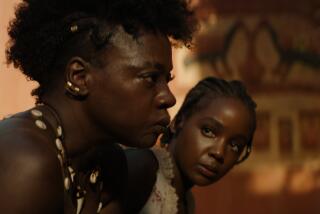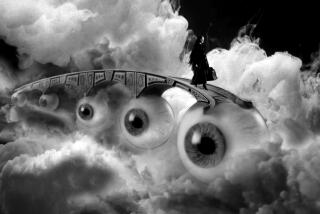John Lithgow and Claire Foy share the love as two of Britain’s most powerful figures in ‘The Crown’
Queen Elizabeth II enjoyed an especially warm relationship with Prime Minister Winston Churchill. That admiration is mirrored in the bond between the actors who play those roles on the Netflix series “The Crown.”
“It’s a complete love affair. I’m completely, completely in love with him. And I’m not alone in that,” says Claire Foy of costar John Lithgow. “The caliber of actor he is, to watch him take on a role that was such a challenge, it’s a joy to watch someone doing that, to have an amazing time in a part.”
Lithgow, the only Yankee in the cast, says of Foy, “Her eyes tell it all. Boy, the cameras adore them. She’s also very smart, a canny actress. All that said, acting with her was hilarious and fun. Some of those scenes, we couldn’t keep a straight face. She’s a quicksilver actress, the kind of person you just dream of acting with.”
Foy, Lithgow and the show have collected a slew of nominations from the SAG Awards, the Golden Globes and Critics’ Choice Television Awards, as well as an AFI honor.
The 32-year-old Foy is charged with playing one of the most famous women in the world during her first years as sovereign. New Yorker Lithgow, 71, has to embody one of the best-known, most quotable British heroes of the last century.

“There was the idea that every British actor would be saying,” here Foy takes on a Jolly Old English bray, “‘What? An American playing Winston Ch-ar-chill?’ Well, lots of English people have been playing, you know, Abraham Lincoln. John never played a victim or a legend. He just played someone who was fighting to the end. He was playing a difficult man who was in his ’80s who was frail but strong.”
Lithgow’s portrayal of that particular lion in winter began with his spring.
“What fascinated me most was Churchill as a young child,” says the actor. “He had a kind of Dickensian childhood. The neglect. And he was a terrible student. His whole life is a study in trying to overcome your feelings of inadequacy.
“We know him as tremendously courageous and decisive. He was also depressive, maudlin, sentimental and he drank like a fish. The best quote I heard in that area was, ‘Churchill was not an alcoholic. Because no alcoholic could drink that much.’ ”
But Churchill was also one of the more formidable minds of his time, especially when it came to political machinations. Lithgow references a “Crown” episode dealing with a toxic fog that ravaged London in 1952, in which Churchill’s inaction contributes to a disaster that proves lethal to thousands. When the prime minister learns one of the victims is a pretty young subordinate of whom he’d become fond, he rushes to the hospital to see her. Then it dawns on him just being there among the carnage could show the British people how much he cared, and he cannily calls for a news conference.
“He’s racked with grief over the death of this beautiful young gal,” Lithgow says. “And yet, he instantly figures out how to turn it to his advantage politically, to turn his own sorrow into political gold.”
Foy’s Elizabeth II is a contrast in just about every way. Born into the highest of privilege, greatness thrust upon her, yet limited by tradition and even her gender.
“She wasn’t educated the way girls are educated now, but to be honest, I’d bet lots of girls weren’t,” Foy says. “She just had lessons in the constitution — as opposed to current affairs or politics. If she had been a prince, I think she would have been taught in absolutely everything.”
Lithgow says Foy “clearly had done so much homework, how events changed Elizabeth. She’s dealing with enormous grief [over the death of her father, the king]. At the same time, her husband has been incredibly emasculated, becoming the queen’s consort. And she has to learn how to be a queen at 25.
“She’s capable of conveying all those different colors and shadows and feelings. I just watch it in amazement.”
As reliable information about the actual Elizabeth is notoriously hard to come by, Foy says she takes what she gleans through research “with a grain of salt.”
“I didn’t know she was woken up every morning by bagpipes,” she says with a delighted laugh. “She is the head of the church; I think that was the thing I was most surprised about, how significant that was. There could be no divorced people in the family. There could be no divorced people on the grounds of the Windsor Racecourse if she were there.”
Despite all the accolades, Foy says things haven’t really changed for her.
“Definitely not in everyday life because nobody ever recognizes me,” says the Manchester native, caring for her toddler son as she speaks by phone. “But definitely on set just because people quite like to take the mick out of me … as I come through the door, they sort of part.”
She laughs, then when asked about not being recognized, laughs again and says, “People don’t really look at each other in London. Also, you don’t really expect to see the queen on the Underground.”
See the most read stories this hour »
More to Read
From the Oscars to the Emmys.
Get the Envelope newsletter for exclusive awards season coverage, behind-the-scenes stories from the Envelope podcast and columnist Glenn Whipp’s must-read analysis.
You may occasionally receive promotional content from the Los Angeles Times.






